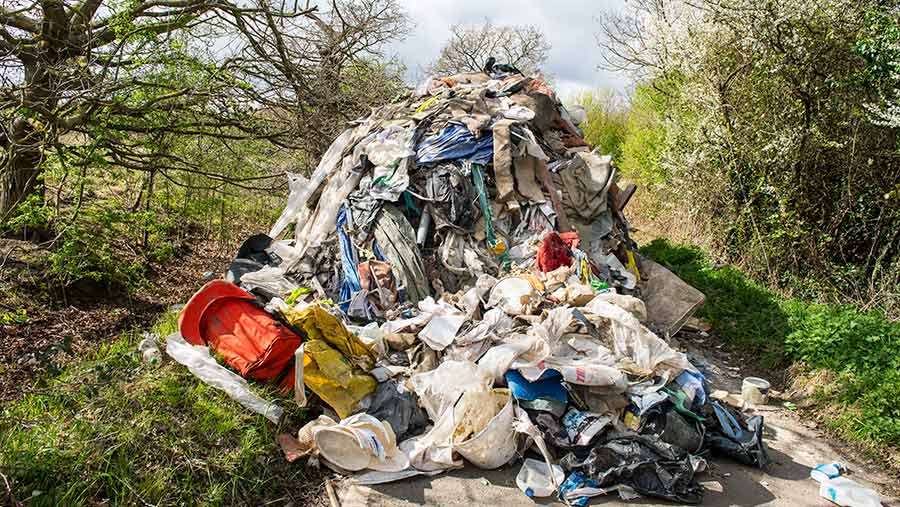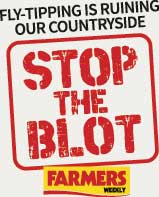Fly-tippers should clear up waste, say ministers
 © BillyPix
© BillyPix Fly-tippers could be forced to clean up their own rubbish under plans to tackle the UK’s growing problem with illegal waste.
The government’s first national litter strategy was unveiled by Defra secretary Andrea Leadsom unveiled on Monday (10 April).
A national Stop the Blot campaign to reduce the amount of fly-tipping in the countryside was launched last week by Farmers Weekly.
Mrs Leadsom said her plan could see litter louts hit with £150 fines in a bid to reduce the near £800m burden of clean-up costs on the taxpayer.
See also: Video – ‘My fly-tipped farm is a war-zone’
“Litter is something that affects us all – blighting our countryside, harming our wildlife, polluting our seas, spoiling our towns, and giving visitors a poor impression of our country.
Antisocial behaviour
“Our litter strategy will tackle this antisocial behaviour by building an anti-litter culture, making it easier for people to dispose of rubbish and hitting litter louts in the pocket.” Further new measures include stopping councils from charging householders for disposal of DIY household waste at civic amenity sites.
 Stop The Blot is a Farmers Weekly campaign designed to raise awareness of the damage caused by fly-tipping
Stop The Blot is a Farmers Weekly campaign designed to raise awareness of the damage caused by fly-tippingLegally, household waste is supposed to be free to dispose of at such sites. The proposals also recommend that offenders on community sentences, including people caught fly-tipping, should help councils clear up litter and fly-tipped waste.
Communities minister Marcus Jones said: “It’s time we consigned litter louts and fly-tippers to the scrap heap of history. Through our first ever national litter strategy we plan to do exactly that.
Selfish minority
“For too long a selfish minority have got away with spoiling our streets. It’s time we sent them a clear message – clean up or face having to cough up.”
Funding will also be made available to support innovative community-led projects to tackle litter that could turn local success stories into national initiatives.
The government will follow the strategy with a new national anti-littering campaign in 2018, working with industry and the voluntary sector to drive behaviour change. Responding to the announcement, Country Land and Business Association Ross Murray said government ministers were right to tackle the issue.
“Litter and fly-tipping is not only a blight on our beautiful countryside, but comes at a major economic cost for farmers and other rural businesses who invariably have to clear it up.
Unaffordable burden
“The cost of this was estimated at £50m last year – an unaffordable burden to bear. “Fines and other penalties are important, but they only work if they are enforced and it’s not clear what additional resources councils and police forces will have to do this.
“This is especially case when dealing with the organised criminal gangs that are increasingly fuelling the rise in fly-tipping incidents.”
Everyone had to work together to tackle the attitudes and behaviours that led to people not taking responsibility for the waste they created, said Mr Murray.
“We would like to see more creative use of measures like naming and shaming, confiscation of vehicles and other property and better education about the consequences of careless littering.”
Tips to prevent fly-tipping
- Ensure gates are closed and locked when not in use
- In hotspot areas, consider physical barriers such as boulders, concrete slabs, wooden logs, tree trunks, strategically-placed earth bunds and trenches
- Improve visibility around field entrances and keep areas tidy
- Install or improve lighting
- Consider CCTV or dummy CCTV cameras in fields and farmyards, signage and security patrols
- Work with police, neighbours, farming groups, FarmWatch and others to exchange information
- Set up a WhatsApp group between farmers and landowners to share intelligence on fly-tipping incidents
